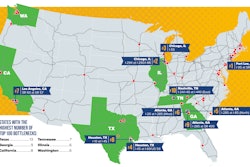Trucking news and briefs for Friday, Feb. 16, 2024:
Federal Maritime Commission upholds ruling on chassis choice
The Federal Maritime Commission on Tuesday, Feb. 13, upheld a 2023 ruling that ocean carriers could not lawfully require that motor carriers use specific intermodal chassis providers to move containers.
The American Trucking Associations’ Intermodal Motor Carriers Conference (IMCC) in August 2020 filed a complaint against the Ocean Carrier Equipment Management Association (OCEMA), Consolidated Chassis Management and the world’s largest ocean carriers alleging they violated the Shipping Act by requiring carriers to use specific default chassis providers and denying motor carriers the right to select the chassis provider for merchant haulage movements.
Last year, an FMC administrative law judge ruled in favor of the IMCC, noting that ocean shippers’ “practice of designating an exclusive chassis provider for merchant haulage and using merchant haulage volume to obtain discounted carrier haulage rates where motor carriers have no choice of chassis providers violates” the Shipping Act, and ordered shippers to cease and desist the practices.
OCEMA and others named in the complaint appealed the 2023 ruling, arguing that the FMC “lacks jurisdiction because the challenged restrictions relate to their contracts with chassis providers and involve overland transportation between the ports and inland facilities.”
The full FMC said the administrative law judge’s ruling was supported “by the record and sound reasoning,” adding that the FMC “plainly has jurisdiction over allegations that ocean common carriers’ practices and rules governing chassis provisioning violate” the Shipping Act.
“The FMC has now confirmed that the actions of these ocean carriers are a clear violation of federal law and must stop,” said IMCC Executive Director Jonathan Eisen. “IMCC and ATA have been fighting this conduct by foreign-owned ocean carriers for more than a decade, so this ruling has been a long time coming.”
[Related: Trucking scores win in intermodal container complaint]
FMCSA seeks driver input to aid Truck Leasing Task Force
The Federal Motor Carrier Safety Administration is asking for information from truck drivers to help the agency’s Truck Leasing Task Force (TLTF) identify terms and conditions in lease contracts that may be unfair to drivers.
FMCSA is specifically asking for driver input about leasing arrangements they have personally experienced or of which they have knowledge. FMCSA is particularly interested in hearing from truck drivers, lessors of CMVs, trucker organizations, social services organizations, consumer rights and advocacy organizations, plaintiffs’ attorneys, academics and researchers, representatives of labor organizations, and state and local government officials.
In a Federal Register notice to be published Friday, Feb. 16, FMCSA included lists of questions for both lessees and lessors of commercial motor vehicles. The questions are examples of information the TLTF would find helpful in completing its task of examining and reviewing the terms, conditions and equitability of common truck leasing arrangements, particularly as they impact owner-operators and trucking businesses subject to such agreements.
Commenters are not required to answer every question and commenters should not view the list as a constraint on sharing information with the agency and the task force, the agency added.
In addition to providing the information to the TLTF members, FMCSA will also share the information with the Consumer Financial Protection Bureau (CFPB), a U.S. government agency dedicated to making sure consumers are treated fairly by banks, lenders and other financial institutions. The DOT has named the CFPB as a technical advisor to the TLTF.
Comments are being accepted for 30 days from publication of the notice in the Federal Register -- through March 17.
[Related: Lease-purchase task force zeroes in on restrictive maintenance covenants]










